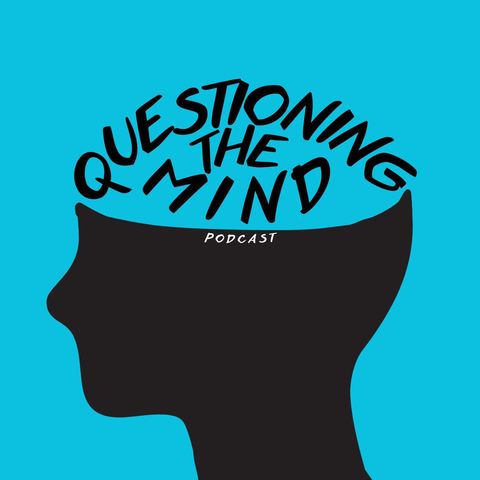
Contacts
Info
Questioning the Mind is a European Solidarity Corps podcast, talked in English and Italian, where we explore interesting facts and myths related to psychology, mental health and neuroscience.

22 NOV 2024 · In this episode we reflected about the existence (or not) of two types of brains: the male and the female. Listen to discover more about the relationship between psychology, sex and gender.
References: Male brain vs. Female brain: are they different:
Joel, D., & Vikhanski, L. (2019). Cérebro e género: Para lá do mito do cérebro masculino e feminino. Temas e Debates. van Anders, S. M. (2013).
Beyond masculinity: Testosterone, gender/sex, and human social behavior in a comparative context. Frontiers in Neuroendocrinology, 34(3), 198–210. https://doi.org/10.1016/j.yfrne.2013.07.001van Anders, S. M., Goldey, K. L., & Kuo, P. X. (2011).
The Steroid/Peptide Theory of Social Bonds: integrating testosterone and peptide responses for classifying social behavioral contexts. Psychoneuroendocrinology, 36(9), 1265–1275. https://doi.org/10.1016/j.psyneuen.2011.06.001
Brain tease:
Grey Matters - The Undergraduate Neuroscience Journal (2015). Ethical history: A contemporary examination of the Little Albert Experiment. https://greymattersjournal.org/ethical-history-a-contemporary-examination-of-the-little-albert-experiment/
13 SEP 2024 · In this episode we talked about the myth that claims that people with mental violence are violent, and explore the causes and consequences of this.
References:
Are people with mental illness violent: American Psychiatric Association (2022). What is mental illness? https://www.psychiatry.org/patients-families/what-is-mental-illness American Psychological Association (n.d.). Mental health. https://www.apa.org/topics/mental-health Douglas, K. M., & Sutton, R. M. (2011). Constructive or cruel? Positive or patronizing? Reactions to expressions of positive and negative stereotypes of the mentally ill. British Journal of Psychology, 102(1), 97–107. https://doi.org/10.1348/000712610X503339 Elbogen, E. B., & Verykoukis, N. (2023). Violence and Mental Illness: Rethinking risk factors and enhancing public safety. New York University Press.Link, B., & Stueve, A. (1995). Evidence bearing on mental illness as a possible cause of violent behavior. Epidemiologic Reviews, 17, 1–10. https://doi.org/10.1093/oxfordjournals.epirev.a036173Silver, E. (2006). Understanding the relationship between mental disorder and violence: The need for a criminological perspective. Law and Human Behavior, 30(6), 685–706. https://doi.org/10.1007/s10979-006-9018-z Silver, E., & Teasdale, B. (2005). Mental Disorder and Violence: An Examination of Stressful Life Events and Impaired Social Support. Social Problems, 52(1), 62–78. https://psycnet.apa.org/doi/10.1525/sp.2005.52.1.62
Brain tease:
Association for psychological science (2018). Harlow’s Classic Studies Revealed the Importance of Maternal Contact. https://www.psychologicalscience.org/publications/observer/obsonline/harlows-classic-studies-revealed-the-importance-of-maternal-contact.html
26 JUL 2024 · In this episode we explore one of the biggest Hollywood clichés: whether if opposites truly attract in relationships.
References: Do opposites really attract:
Chebotareva, E. Y., & Volk, M. I. (2020). Life and family values similarity in inter-ethnic and inter-faith couples. Behavioral Sciences, 10(1). https://doi.org/10.3390/bs10010038Czyżkowska, A., & Cieciuch, J. (2022). Marital goals: Circular value-based model and measurement. Current Psychology, 41(6), 3401–3417. https://doi.org/10.1007/s12144-020-00787-0Lilienfeld, S. O., Lynn, S. J., Ruscio, J., & Beyerstein, B. L. (2010). 50 great myths of popular psychology. Wiley-Blackwell.Relvas, A. P. (1996). O ciclo vital da família. Edições Afrontamento.
Brain tease:
Queensland Health (2022). Brain Map Frontal Lobes. https://www.health.qld.gov.au/abios/asp/bfrontal Tidsskriftet (2022). Lessons to be learnt from the history of lobotomy. https://tidsskriftet.no/en/2022/12/essay/lessons-be-learnt-history-lobotomy
26 JUL 2024 · In this episode we talked about what is psychology, why it is a science and the requirements to become a psychologist in Europe.
References: What is psychology:
American Psychological Association (2018). APA Dictionary of Psychology. https://dictionary.apa.org/brain-plasticity American Psychological Association (2024). About APA: Frequently asked questions about the American Psychological Association. https://www.apa.org/support/about-apa EFPA (2019). EuroPsy – European Certificate in Psychology: EFPA Regulations on EuroPsy and Appendices.Pastorino, E., & Doyle-Portillo, S. (2022). What is psychology? Foundations, Applications, and Integration (5th ed.). Cengage Learning.
Brain Tease:
Feuillet, L., Dufour, H., & Pelletier, J. (2007). Brain of a white-collar worker. Lancet, 370(9583), 262. https://doi.org/10.1016/S0140-6736(07)61127-1New Scientist (2007). Man with tiny brain shocks doctors. https://www.newscientist.com/article/dn12301-man-with-tiny-brain-shocks-doctors/
Questioning the Mind is a European Solidarity Corps podcast, talked in English and Italian, where we explore interesting facts and myths related to psychology, mental health and neuroscience.
Information
| Author | PodDARE: da Ravenna al Mondo |
| Organization | IG Ravenna Actions |
| Categories | Health & Fitness , Mental Health |
| Website | - |
| igractions@gmail.com |
Copyright 2024 - Spreaker Inc. an iHeartMedia Company
